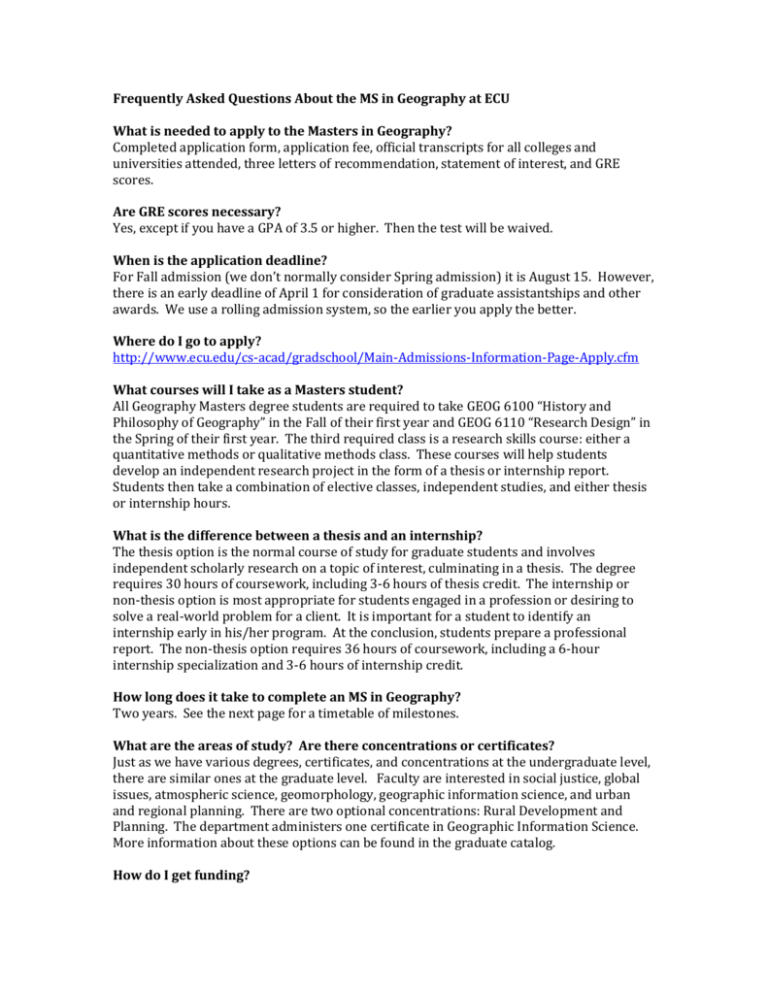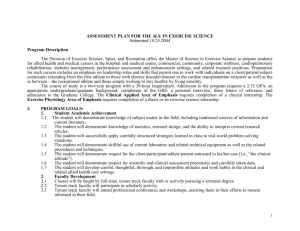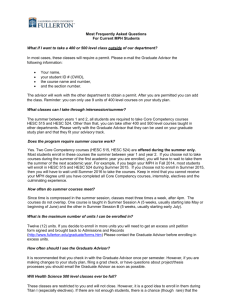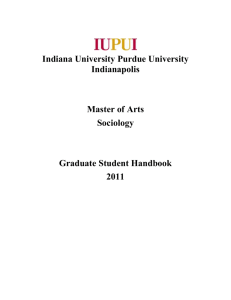Frequently Asked Questions About the MS in Geography at ECU
advertisement

Frequently Asked Questions About the MS in Geography at ECU What is needed to apply to the Masters in Geography? Completed application form, application fee, official transcripts for all colleges and universities attended, three letters of recommendation, statement of interest, and GRE scores. Are GRE scores necessary? Yes, except if you have a GPA of 3.5 or higher. Then the test will be waived. When is the application deadline? For Fall admission (we don’t normally consider Spring admission) it is August 15. However, there is an early deadline of April 1 for consideration of graduate assistantships and other awards. We use a rolling admission system, so the earlier you apply the better. Where do I go to apply? http://www.ecu.edu/cs-acad/gradschool/Main-Admissions-Information-Page-Apply.cfm What courses will I take as a Masters student? All Geography Masters degree students are required to take GEOG 6100 “History and Philosophy of Geography” in the Fall of their first year and GEOG 6110 “Research Design” in the Spring of their first year. The third required class is a research skills course: either a quantitative methods or qualitative methods class. These courses will help students develop an independent research project in the form of a thesis or internship report. Students then take a combination of elective classes, independent studies, and either thesis or internship hours. What is the difference between a thesis and an internship? The thesis option is the normal course of study for graduate students and involves independent scholarly research on a topic of interest, culminating in a thesis. The degree requires 30 hours of coursework, including 3-6 hours of thesis credit. The internship or non-thesis option is most appropriate for students engaged in a profession or desiring to solve a real-world problem for a client. It is important for a student to identify an internship early in his/her program. At the conclusion, students prepare a professional report. The non-thesis option requires 36 hours of coursework, including a 6-hour internship specialization and 3-6 hours of internship credit. How long does it take to complete an MS in Geography? Two years. See the next page for a timetable of milestones. What are the areas of study? Are there concentrations or certificates? Just as we have various degrees, certificates, and concentrations at the undergraduate level, there are similar ones at the graduate level. Faculty are interested in social justice, global issues, atmospheric science, geomorphology, geographic information science, and urban and regional planning. There are two optional concentrations: Rural Development and Planning. The department administers one certificate in Geographic Information Science. More information about these options can be found in the graduate catalog. How do I get funding? Funding is competitive and generally comes from two sources: the departmental budget and external grants. Students funded on departmental assistantships will be expected to become Teaching Assistants or provide services to the Geographic Information Science Center, Kim Computer Lab, or other departmental labs. Students funded on an external grant will work on the project under the direction of the Principal Investigator. Assistantships are competitive and are approximately $11,000 per academic year. Additional money is available for highly qualified students. How do I indicate that I want to be considered for funding/scholarships on the application? All applicants will automatically be considered for all available assistantships, scholarships and out-of-state tuition remissions. How much is tuition? Tuition and fees, for the 2015-16 academic year, are $6,827 for North Carolina residents and $19,429 for non-residents. The department has a limited number of tuition remissions, which allow out-of-state students to pay the in-state rate. These are highly competitive. Please consider costs beyond tuition and fees when deciding to apply to graduate school: http://www.ecu.edu/cs-acad/financial/faq.cfm#a3 Contact: Dr. Scott Curtis, Graduate Director, Brewster A232, 328-2088, curtisw@ecu.edu











